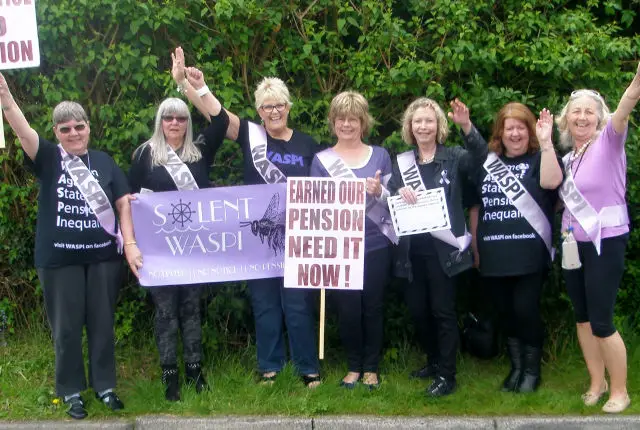Shelagh Simmons, Coordinator of the Solent WASPI Supporters’ Group, shares this news during the landmark week for for the UK state pension. Ed
This week a milestone in the history of the British State Pension is reached.
On Tuesday 6th November 2018, the State Pension Age (SPA) for men and women equalised at 65. It is the first time men and women’s SPA has been the same.
Reflected social norms
For decades, women’s SPA had been 60. This disparity was for a number of reasons reflecting social norms of the time.
This included to help men who had to wait for their wives to reach SPA before they could claim their own pensions, and in recognition of the unpaid work women did.
Comes at a cost for some
So, for everyone who wants equality – and we certainly do – this should be welcomed. But for one generation of women, it comes at a huge cost.
In 1995, a Pensions Act was passed in Parliament which would see SPA equalisation take place between 2010-2020. All well and good, you might think, there was plenty of time to prepare.
Lack of communication
Unfortunately, however, the Department for Work and Pensions (DWP) failed to properly inform the first cohort of those to be affected by the change – women born in the 1950s.
There was limited media coverage, but no direct communication at all until 14 years later in 2009 when letters began to be sent.
And even then, not everyone was told because the process was put on hold while another rise was planned.
Government sped up the process
In 2011, despite a 2010 manifesto pledge not to make any further changes for women before 2020, the Conservative Government in coalition with the Liberal Democrats, sped up the process.
Women were hit again by a Pensions Act increasing the SPA for men and women to 66.
Boast from Osborne
The then Chancellor of the Exchequer, George Osborne, boasted in an international forum that it was one of the “less controversial”, easiest single money saving things he did. And although the DWP claims to have written to everyone about this in 2012-13, for many women it was the first time they knew about any rise at all.
Those approaching 60 suddenly discovered they would have to wait up to an extra six years for their pension.
Ill-informed sneers fall wide of the mark
Some women have still not had a letter from the DWP. Ill-informed sneers like “you wanted equality and now you’ve got it” fall wide of the mark.
1950s women weren’t the ‘have it all’ generation but have certainly been the ‘do it all’ one, juggling work (often of the low paid part-time kind) with raising families.
Worklife-long discrimination
They have faced discrimination all their working lives in pay and pension opportunities, often being overlooked for workplace advancement.
And they were brought up to believe that if you worked hard and paid your dues you would have some measure of financial security at 60 with a State Pension.
Gap between men and women’s pension income nearly 40%
Indeed, women are far more likely than men to be totally dependent on the SP for their income.
A recent report by the Prospect Union found that the gap between men and women’s pension income is nearly 40%.
Lip service
Legislative lip service may have been paid to equality, but the reality has been very different. 1950s women have been trailblazers, leading the way for today’s women, but without the tangible benefits. And they continue to care for older relatives and grandchildren.
They still make an enormous contribution to their families, communities and the economy in voluntary work.
Equality without other inequalities
Yes, we wanted equality but, without steps to address other inequalities, SPA equalisation must be seen as a money saving ploy, pure and simple.
SPA equalisation in the context of an uneven equality playing field puts us at a further financial disadvantage. And the 2011 acceleration of the timetable was
another slap in the face for this generation of women.
Government ignored the issue
The Government is fully aware of the issue, but has so far ignored it. Speaking in a recent interview, former Saga Director-General and later Pensions Minister, Baroness Ros Altmann, revealed the Government’s attitude to us.
Male ministers “absolutely refused to listen,” she said.
“There was an element of men not understanding women’s lives. Women have been the poor relation in pensions for a long time. If you are going to equalise – which I think makes some sense – you have to do it fairly, but this was done in a brutal way.”
‘Brutal’ is right
Some women have been forced to sell their homes to make ends meet. Some have been forced – often in poor health – to take unsuitable jobs because they have no other income.
Others have had divorce settlements calculated on a women’s SPA of 60. But, regardless of circumstances, all 1950s women have been victims of a grave injustice.
WASPI Campaign is gathering momentum
No wonder the Women Against State Pension Inequality (WASPI) Campaign is gathering momentum. If the Government thought it could sit this out, wait for us all to reach our new SPA and we would go away, they were wrong.
Thousands of maladministration complaints have been made to the DWP and our issue is currently being investigated by the Parliamentary Ombudsman (PO). Should the PO find in our favour, he can ask the Government to restore women to the financial position they would have been in had the maladministration not occurred.
We welcome equality. We have been fighting for it all our lives. But it is a perverse kind of equality that sets up a generation of already financially disadvantaged women for a potential £40,000+ loss without properly informing them and giving them enough time to prepare. And be warned; our campaign is also your campaign.
If the Government thinks it can get away with playing fast and loose with our pensions, it will do the same to you too. In this landmark week for the State Pension, the WASPI Campaign is ‘not going away’.
Island Rally
A rally is planned on the Isle of Wight between 10am and midday on Saturday 10th November.
Check the Facebook Page for updates as the weather forecast may call affect whether it goes ahead.





